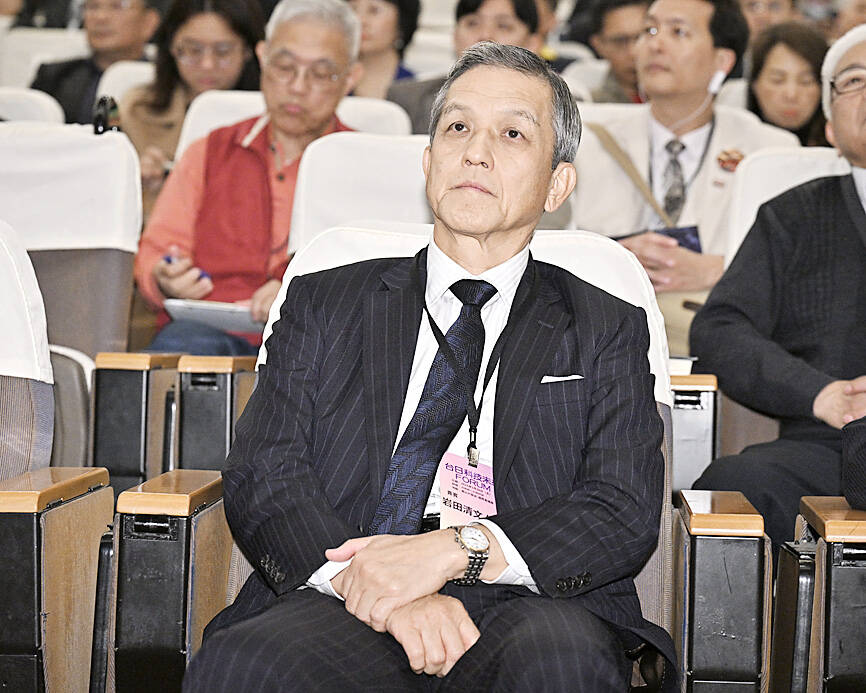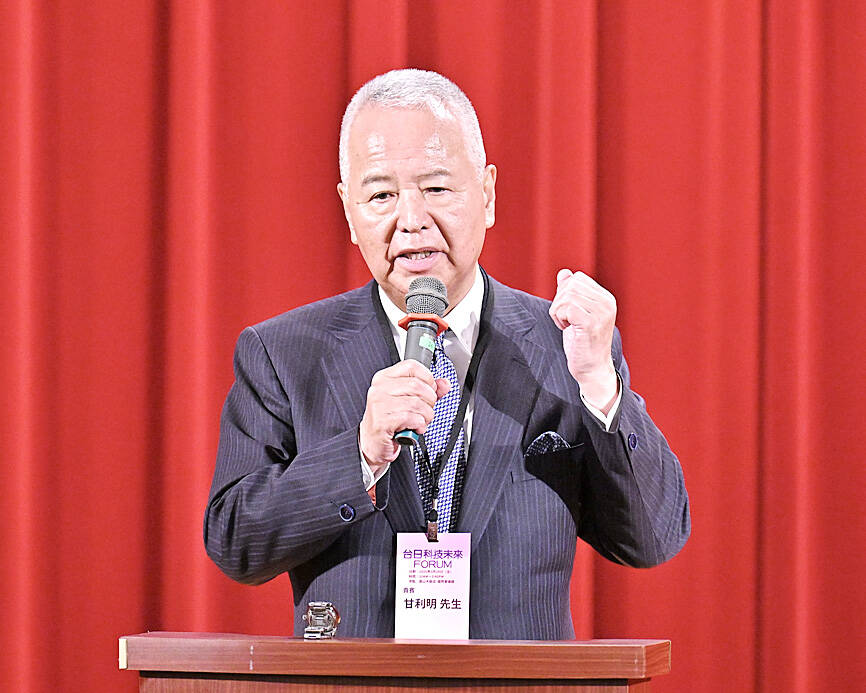Japan’s former top army commander yesterday expressed hope that Taiwan would form a “semiconductor alliance” with Japan.
“Taiwan and Japan share a destiny,” retired general Kiyofumi Iwata, a former chief of staff of the Japan Ground Self-Defense Force, told a conference in Taipei on semiconductors and geopolitics hosted by the Indo-Pacific Strategic Thinktank after reiterating former Japanese prime minister Shinzo Abe’s aphorism that “a Taiwan contingency is a Japan contingency.”
The Russian invasion of Ukraine has shown the important role chips play in modern warfare, Iwata said.

Photo: Tu Chien-jung, Taipei Times
Semiconductors are the key component in a vast array of weapons ranging from High Mobility Artillery Rocket Systems, Javelin anti-tank guided missiles, uncrewed aerial vehicles and telecommunications satellites, he said.
Chips used in military equipment are comparatively large wafers ranging from 45-nanometers to 250-nanometers, Iwata said.
Despite Western and Japanese embargoes, Moscow has sourced military-grade semiconductors from China, with Chinese chips accounting for 89 percent of all semiconductor imports in Russia, he said.

Photo: Tu Chien-jung, Taipei Times
Artificial intelligence (AI) and chips are expected to have an even larger impact, as militaries are already adopting drones for land, sea and air warfare, he said.
The performance goals of the US Air Force Collaborative Combat Aircraft program suggests that a few soldiers would soon be able to direct hundreds of combat drones at a time, he said.
Beijing’s policy is to build the Chinese People’s Liberation Army (PLA) into a force capable of invading Taiwan, he said, adding that the PLA leadership has shown an appreciation for the military potential of chips and AI.
Taiwan, Japan and the US must develop a joint network of semiconductor supply chains to ensure they retain the capability to deter the PLA and defeat it if necessary, Iwata said.
Japanese would no more allow Taiwan to fall into Chinese hands than Taiwanese themselves, he said in a call for greater cooperation in technology between the two nations.
Former Japanese minister of economy, trade and industry Akira Amari told the conference that Chinese-developed AI program DeepSeek poses a security threat to the nations of its users and is part of Beijing’s bid to replace global digital infrastructure.
Out of the global race to develop generative AI, DeepSeek is the first to turn a profit, largely thanks to low costs and giving users ownership over content they create, Amari said.
China’s aim is to make the world dependent on DeepSeek as infrastructure, granting Beijing access to data on a global scale, he said, adding that China owns 100 percent of input to the program.
DeepSeek users who work for commercial entities or research groups are feeding their intellectual property to a Chinese-owned database, allowing Beijing to know of or predict technological developments, he said.
China would effectively possess knowledge that enables it to take away any government’s autonomy and ability to make decisions independently, Amari said.
Japan is not a competitor, but a partner in Taiwan’s efforts to create free and secure global chip supply chains, he said.
Society is undergoing a systemic digital transformation in which all activities are driven by data, he said, adding that semiconductors undergird the functioning of nations and economies.
By any measure, Taiwan Semiconductor Manufacturing Co (TSMC) is the world’s sole supplier of advanced chips unrivalled by Intel or Samsung, an achievement Taiwan is rightfully proud of, he said.
Eighty percent of TSMC’s revenue is accounted for by a handful of companies, including Nvidia, which controls semiconductor design, Amari said.
With an ever-growing number of companies trying to enter the chip design sector, TSMC’s original equipment manufacturing capacity would not suffice to meet demand, he said.
Japan’s creation of Rapidus is meant to fill this gap and would not be a direct competitor to TSMC, given the latter’s increasing specialization on customization and end-of-line packaging, he said.
Working hand-in-hand, Rapidus and TSMC could stabilize the world’s chip supply, and ensure free and democratic societies continue their digital transformations, he said.
Hundreds of companies and thousands of manufacturing steps go into making the most advanced chips, he added.
The US, Japan and the Netherlands source 80 percent of the world’s chipmaking equipment, Japan sources 55 percent of the materials and Taiwan makes 94 percent of the final product, Amari said.
The notion that one country can produce top-of-the-line chips on its own is a fantasy, but explaining this to US President Donald Trump might be the biggest challenge to the industry, he added.

A magnitude 4.9 earthquake struck off Tainan at 11:47am today, the Central Weather Administration (CWA) said. The hypocenter was 32.3km northeast of Tainan City Hall at a depth of 7.3km, CWA data showed. The intensity of the quake, which gauges the actual effect of a seismic event, measured 4 in Tainan and Chiayi County on Taiwan's seven-tier intensity scale, the data showed. The quake had an intensity of 3 in Chiayi City and County, and Yunlin County, while it was measured as 2 in Kaohsiung, Nantou County, Changhua County, Taitung County and offshore Penghu County, the data showed. There were no immediate reports of

‘DENIAL DEFENSE’: The US would increase its military presence with uncrewed ships, and submarines, while boosting defense in the Indo-Pacific, a Pete Hegseth memo said The US is reorienting its military strategy to focus primarily on deterring a potential Chinese invasion of Taiwan, a memo signed by US Secretary of Defense Pete Hegseth showed. The memo also called on Taiwan to increase its defense spending. The document, known as the “Interim National Defense Strategic Guidance,” was distributed this month and detailed the national defense plans of US President Donald Trump’s administration, an article in the Washington Post said on Saturday. It outlines how the US can prepare for a potential war with China and defend itself from threats in the “near abroad,” including Greenland and the Panama

The Chinese Nationalist Party (KMT) is maintaining close ties with Beijing, the Democratic Progressive Party (DPP) said yesterday, hours after a new round of Chinese military drills in the Taiwan Strait began. Political parties in a democracy have a responsibility to be loyal to the nation and defend its sovereignty, DPP spokesman Justin Wu (吳崢) told a news conference in Taipei. His comments came hours after Beijing announced via Chinese state media that the Chinese People’s Liberation Army’s Eastern Theater Command was holding large-scale drills simulating a multi-pronged attack on Taiwan. Contrary to the KMT’s claims that it is staunchly anti-communist, KMT Deputy

RESPONSE: The government would investigate incidents of Taiwanese entertainers in China promoting CCP propaganda online in contravention of the law, the source said Taiwanese entertainers living in China who are found to have contravened cross-strait regulations or collaborated with the Chinese Communist Party (CCP) could be subject to fines, a source said on Sunday. Several Taiwanese entertainers have posted on the social media platform Sina Weibo saying that Taiwan “must be returned” to China, and sharing news articles from Chinese state media. In response, the Mainland Affairs Council (MAC) has asked the Ministry of Culture to investigate whether the entertainers had contravened any laws, and asked for them to be questioned upon their return to Taiwan, an official familiar with the matter said. To curb repeated